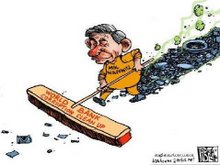Wolfowitz Response to Melkert and Danino
Read Paul Wolfowitz's 10 page response to the testimony of Ad Melkert and Roberto Danino. Letter dated May 2, 2007. Available online at the Washington Post
Wolfowitz's reign of sleaze and corruption at the World Bank must end. The Board of Directors needs to act to restore the credibility of the Bank.
Read Paul Wolfowitz's 10 page response to the testimony of Ad Melkert and Roberto Danino. Letter dated May 2, 2007. Available online at the Washington Post
at
11:41 AM
![]()


3 comments:
Why does the Washington Post put this on their website immediately? but they do not post on their website either the Danino or the Melkert statements. To get those, you need to buy the Financial Times. Any idea why WaPo would not provide balanced documentation? Is this the difference that the $800/hour lawyer makes.
The answer is simple --- Danino and Melkert gave it to the FT first.
Why should the WP dedicate valuable real estate to their statements already published elsewhere.
They can, and did refer to it in news articles, and furthermore, anyone who wants to see it online only have to either visit here or at the worldbankpresident.org and see it.
I wouldn't attribute to Bennett being able to control the Post.
Another note: When his client Clinton lied under oath, he couldn't save his hide either.
On that note, the submission by PW to the board and the follow on is not done under oath --- so PW spares himself the charge of perjury on top of everything else.
He can simply be found to be guilty of lying, misleading the board, and other sundry offenses.
Pretty small potatoes compared to putting forward intelligence about the WMD threat from Iraq.
He conned Colin Powell to speak for that at the UN.
The Wolfowitz and Riza statements are available online at the Washington Post and the Wall Street Journal, respectively. Did the Ad Hoc Committee approve their publication? If so, the documents would be on the World Bank website, but they are not. Wolfowitz is clearly bound by the Bank disclosure policy (need to ask permission before disclosing a document being considered by the Board). Riza works for the Foundation for the Future but is paid by the Bank so she may (or may not?) be subject to the disclosure policy. In any case the Wall Street Journal made much of her not being allowed to tell her side of the story. Yet her statement was made public on April 12 and again now.
Post a Comment